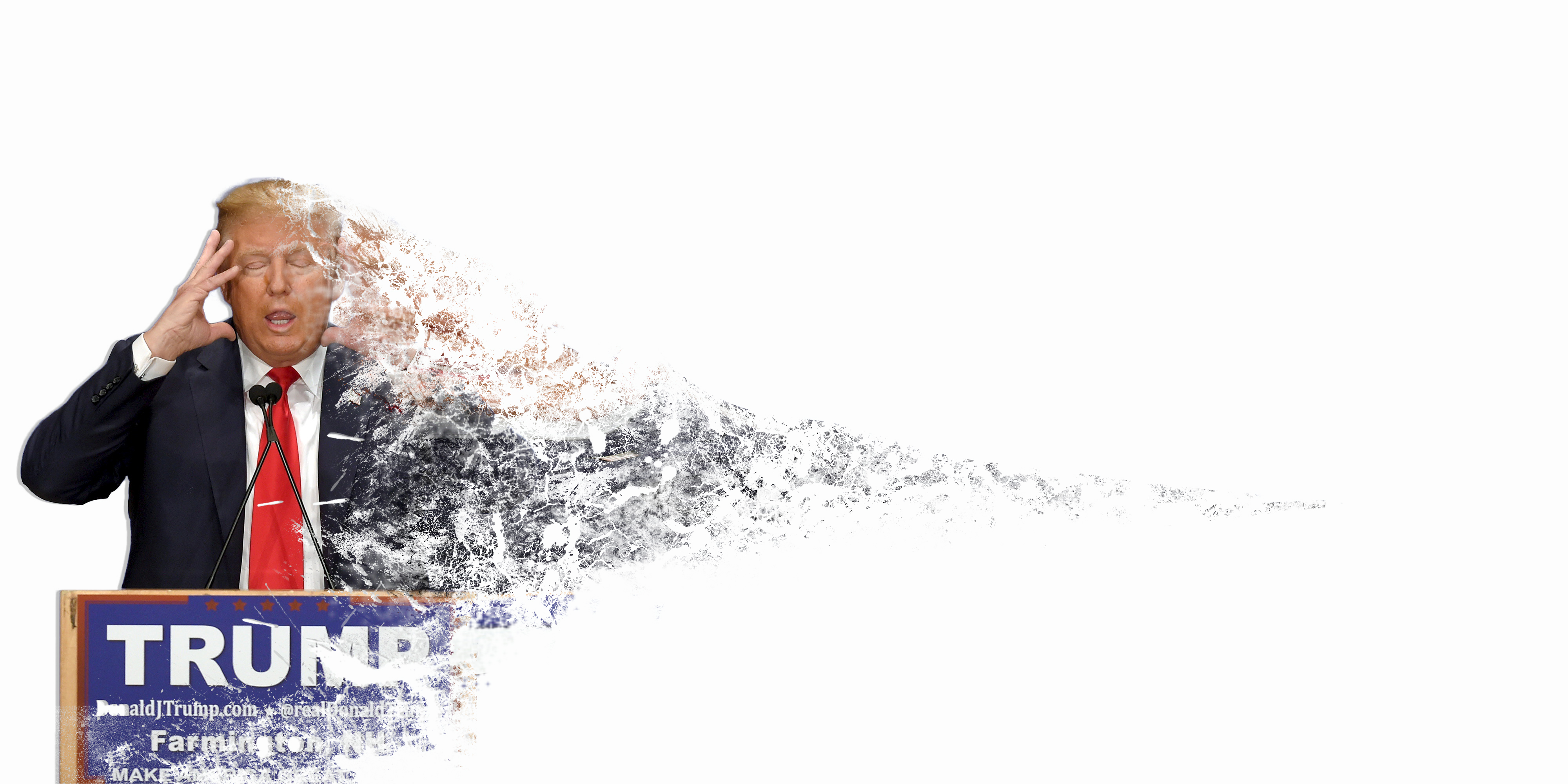The disintegration of Donald Trump
Why his nationalist challenge to the status quo is disappearing before our eyes


For just a moment it seemed that Donald Trump's bid for the presidency contained the seeds of an ideological revolution. Trump had tapped into something that felt like a fresh European import, an ideological right wing motivated by populist nationalism rather than conservatism.
Like European rightists in Hungary and Poland, he wanted a wall to shut out "invading" immigrants. Like the Front Nationale in France, he showed no taste for dismantling the welfare state, only in putting its levers of power to work for his native clients. Like UKIP in Britain, a map of where his strongest supporters live is practically a map of the nation's deindustrialization.
In Trump we suddenly seemed to have the kind of culture warrior imagined by thinkers like James Burnham, who opposed liberalism not because it offends the Constitution or runs roughshod over the little platoons of civil society, but because it is the verbal justification for the contraction of Western societies: the diminution of their military power and the demographic decline of their native populations.
The Week
Escape your echo chamber. Get the facts behind the news, plus analysis from multiple perspectives.

Sign up for The Week's Free Newsletters
From our morning news briefing to a weekly Good News Newsletter, get the best of The Week delivered directly to your inbox.
From our morning news briefing to a weekly Good News Newsletter, get the best of The Week delivered directly to your inbox.
Instead of professing loyalty to a free market that is indifferent when choosing between Americans and foreigners, Trump acknowledged that trade can be a form of economic competition, not just cooperation. And so he promised to change the rules of the game to favor Americans again.
Further, Trump pit the cost of foreign wars against the interests of Americans, asking people to imagine where America would be if the country had invested all those trillions spent on a war in Iraq in America instead. Because Trumpism seemed to be generated by global economic shifts, and because he was so easy to connect to global trends in politics, he suddenly seemed inevitable and formidable.
But over the past few months, there has been a lot of evidence that Trump's populist-nationalism is disintegrating. In September he released a tax-reform plan that is much beloved by the most anti-nationalist conservative thinkers around. In fact it is the very thing that Beltway creatures like Stephen Moore of the Club for Growth cite when they try to explain their sudden and perplexing support for Donald Trump.
Trump has also sounded completely out of his depth on immigration, much to the chagrin of his restrictionist fans. In a debate in Detroit, where Trump would supposedly have some of his most nationalist-minded fans, Trump said, "I'm changing. I'm changing. We need highly skilled people in this country, and if we can't do it, we'll get them in." He described his position on immigration as "softening" and then long-windedly explained why Americans would not take seasonal jobs on some of Trump's American properties. One of the reasons he offered was the weather. That's right, the pro-American-worker Trump says that America is just too hot for American workers. Trump also pushed "touchback" amnesty, where illegal immigrants are granted legal status if they go home and obtain a guest-worker pass from an employer. Suddenly the "big beautiful door" in the Mexican border wall sounds a lot bigger. As Trump has begun to emphasize about immigration, "everything is negotiable."
A free daily email with the biggest news stories of the day – and the best features from TheWeek.com
Trump's non-interventionism also seems to be on the table. In the Detroit debate he talked about creating "safe zones" in Syria to stem the refugee flow. And in the Miami debate he said he would commit ground troops to Syria and Iraq: "We really have no choice, we have to knock out ISIS... I would listen to the generals, but I'm hearing numbers of 20,000-30,000." It is unclear which generals have Trump's ear, but the number of troops he cited sounds remarkably like he has been told about Frederick Kagan's white paper on defeating ISIS. Essentially, Trump endorsed the plan for Iraq and Syria that has been promoted lustily by Lindsey Graham and Marco Rubio. In other words, gone is the America-first foreign policy, in comes the non-credible plan to transform the region again through force of arms, with America leading a mythical, and surely quite moderate, Sunni fighting force.
As Ben Carson aptly put it last week, "There are two Donald Trumps." Indeed, Trump has confessed he plans to change from nationalist caterpillar into establishmentarian butterfly. "When I'm president I'm a different person. I can do anything. I can be the most politically correct person you have ever seen."
Indeed, the transformation is already showing. On policy, Trump is caving to normal Republicanism. He's trying to get elected by pining for someone to finish the dang fence but has amnesty on the mind. He's promising to protect American workers from unfair competition, but angling to pass a plutocratic tax reform. By the end of his campaign the only thing he'll have added to the Republican Party is a reputation for crudity and disorderly violence.
His nationalist challenge to the status quo is disintegrating before our eyes. Instead of the inevitable transformation of the American right, Donald Trump is just the most successful huckster, selling gold coins and survival seeds to a scared public.
Michael Brendan Dougherty is senior correspondent at TheWeek.com. He is the founder and editor of The Slurve, a newsletter about baseball. His work has appeared in The New York Times Magazine, ESPN Magazine, Slate and The American Conservative.
-
 Why is the Pentagon taking over the military’s independent newspaper?
Why is the Pentagon taking over the military’s independent newspaper?Today’s Big Question Stars and Stripes is published by the Defense Department but is editorially independent
-
 How Mars influences Earth’s climate
How Mars influences Earth’s climateThe explainer A pull in the right direction
-
 ‘The science is clear’
‘The science is clear’Instant Opinion Opinion, comment and editorials of the day
-
 The billionaires’ wealth tax: a catastrophe for California?
The billionaires’ wealth tax: a catastrophe for California?Talking Point Peter Thiel and Larry Page preparing to change state residency
-
 Bari Weiss’ ‘60 Minutes’ scandal is about more than one report
Bari Weiss’ ‘60 Minutes’ scandal is about more than one reportIN THE SPOTLIGHT By blocking an approved segment on a controversial prison holding US deportees in El Salvador, the editor-in-chief of CBS News has become the main story
-
 Has Zohran Mamdani shown the Democrats how to win again?
Has Zohran Mamdani shown the Democrats how to win again?Today’s Big Question New York City mayoral election touted as victory for left-wing populists but moderate centrist wins elsewhere present more complex path for Democratic Party
-
 Millions turn out for anti-Trump ‘No Kings’ rallies
Millions turn out for anti-Trump ‘No Kings’ ralliesSpeed Read An estimated 7 million people participated, 2 million more than at the first ‘No Kings’ protest in June
-
 Ghislaine Maxwell: angling for a Trump pardon
Ghislaine Maxwell: angling for a Trump pardonTalking Point Convicted sex trafficker's testimony could shed new light on president's links to Jeffrey Epstein
-
 The last words and final moments of 40 presidents
The last words and final moments of 40 presidentsThe Explainer Some are eloquent quotes worthy of the holders of the highest office in the nation, and others... aren't
-
 The JFK files: the truth at last?
The JFK files: the truth at last?In The Spotlight More than 64,000 previously classified documents relating the 1963 assassination of John F. Kennedy have been released by the Trump administration
-
 'Seriously, not literally': how should the world take Donald Trump?
'Seriously, not literally': how should the world take Donald Trump?Today's big question White House rhetoric and reality look likely to become increasingly blurred
